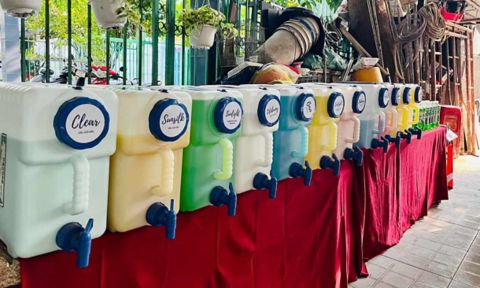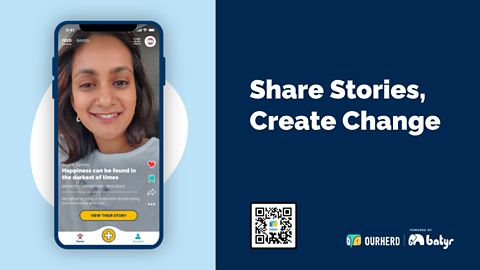What is the motivation behind your business?
Marcus (the co-founder of Homie) and I met during a charity bike ride in Cambodia, and we both felt that there was a very real misunderstanding and stigma associated with people experiencing homelessness and people living rough. This felt like the logical place to start as it was so prevalent - it was on the front doorstep and we were seeing it every day. For us, it stemmed from a feeling of an injustice in terms of the representation of people who were experiencing homelessness. There was this misconception that they were drug addicts and alcoholics, and a lot of that is very unwarranted.
After returning to Melbourne, you created the Facebook page Homeless of Melbourne which profiles people who are experiencing or have previously experienced homelessness in order to raise awareness of the issue by sharing their stories. Can you talk about the influence that your Facebook page has had on establishing your business?
It was initially an adaptation of the humans in New York model. I think that every new idea is an adaptation of an old one and we saw this and it worked so well. Especially just in regards to profiling people, and humans, we thought let’s try and focus on people experiencing homelessness and really try and make a bit of a difference.
Things really spiralled after the Facebook page was established. It was just something we did when we had time, while I was studying and had a break or when Marcus had a break from work, we would just get together and go out. I was studying Professional Communication at the time, so it was good for me because I was learning and practising interview skills. Marcus is also a talented photographer so we worked well, there was good synergy there. Plus we got along really well, it was so enjoyable, doing something that you love but with a mate.
How did the Homeless of Melbourne Street Store come together?
The Facebook page was getting a lot of attention and we were getting a lot of feedback in terms of what we could do and where we could help. Which we didn’t really know ourselves, we were just becoming familiar with people experiencing homelessness and the ways to help alleviate that. We got involved with the Street store initiative that started in South Africa which is essentially a ‘Pop up’ cardboard store. People could come and bring either brand new clothing or clothing that was still in a very good condition that they were willing to part with. We also got donations from some brands as well, including Puma and a few other stores which was awesome. It was just about providing a dignified shopping experience for people experiencing homelessness, and making that connection between the ‘have’s’ and the have-nots. Especially at Christmas time, it was a very emotional day and there was a lot of feeling around it. I think we were quite lucky, but I think you also create your own luck in a sense. There was also a lot of hard work that went on behind the scenes and that goes into the planning and execution.
How did the Pop Up street store evolve into Homie?
After the success of the Street Store, we thought there is more that we can do. So we began challenging ourselves. I saw a Facebook ad for Grill’d and Pozible and we began workshopping ideas for how to create a more permanent replica of that dignified shopping experience but making it even more special. So we came up with the idea of Homie. It was very much taking that same idea from the Street store – the essence of that day, "do good, have fun’". We had gotten some media attention from the Pop Up event and then someone from Melbourne Central saw it and wanted to support us by offering us a retail space. It was another one of those things where initially there was a lot of uncertainty, but everything sort of fell into place. Luckily we had connections through Target and acquired a lot of fixtures and fittings for free. We also had a lot of support from our mates, such as artists who came in and did artwork for us. We were really lucky with the community support that we got, even in our immediate networks, and we managed to create our space.
How did you establish the house label?
We had achieved our crowdfunding goal of $15,000, and initially we were selling donated clothing, but we started to produce our own clothing line because we had the rewards during the Pozible campaign. So we used our homeless of Melbourne monogram and then started printing that on t-shirts. It became really popular and we saw that it was selling much better than any of the other products that we had. So then we ended up just having our own stuff because it was so popular which is great. So that’s how the brand and the label was born - Homie Apparel.
In just a year you have gone from an idea to a pop-up store in Melbourne central to now having just opened your first flagship store on Brunswick Street; has much changed along the way?
I guess a lot has shifted, especially in terms of our focus. Initially, it was a "one for one" clothing policy where you buy a t-shirt and we donate a t-shirt, which is really easy to understand. It was a ‘pay it forward’ type mentality but we came to find that it wasn’t actually a sustainable way to operate. And it wasn’t really making the difference that we wanted to make. The VIP days did because they were just a real confidence boost. And they still are, it’s about making connections and just providing a real pick-me-up experience. But we wanted to now figure out how we could alleviate, and maybe one day eradicate people experiencing homelessness. So we decided that a logical place to start was working with youth experiencing homelessness, and especially providing employment and training for communities within the Homie stores. That’s what we have to work with, and what we can do immediately. We have a few employees at the moment who are engaged in homelessness services who work in a casual or part-time basis and are renumerated as staff which is really cool. Ultimately it’s about providing pathways out of experiencing homelessness, and focusing on the youth because people experiencing homelessness becomes very chronic after the age of 25. So that’s what we’re focusing on and what we are building towards, creating as many opportunities for people, and in a really supportive environment.
What is your vision for the future?
Without profit, there is no purpose. And that’s really important, it is tricky to run a sustainable business, let alone providing the social impact that we are. Initially, we had this vision of having as many Homie stores as possible. It was originally about building the brand up which is really exciting, but then we sort of took a real step back and thought, well what do we want to do here? We identified that it is about the pathway out of experiencing homelessness, especially for young people who are at risk or who are currently experiencing it. And also – I think what Homie really represents is hope as well, that there is this opportunity, and there will be more of these opportunities coming in the future. So I think that what we really want to do is consolidate what we’ve got going on here and do it really well. We want to get these young people transitioning in a supportive way, into full-time employment elsewhere and helping them achieve their goals and dreams. We also want to be a real base for them, where they can come and feel that they are supported and will get the opportunity to achieve their dreams. I’d love to have a store overseas somewhere and see if the concept works elsewhere, but for us it’s really about this; if we can get one person that feels like their life has changed as a result of what Homie has done for them, then that’s kind of enough. But the goal is to create it into a self-sustaining business so that we can increase our social impact.
What lessons have you learned so far on your business journey?
When I first heard of people starting not-for-profits at school, I had this idea that there was this formula or this book you could read that would teach you how to do it. However, I have found that the best way to learn is through experience. And they are all cliché’s, but I’ve made so many mistakes that I can’t even count them. And that’s such a good thing as well. The best way to actually learn is through experience, and I’m able to wake up today and I absolutely love it. But some really interesting things that I haven’t really foreseen is that in order to do good for other people, you need to run a profitable business. I’ve just been really amazed at how much I’ve learned as a result of doing this. And I think that there’s no secret to it, it’s just about going out there and having a crack. And that’s probably the biggest lesson I’ve been able to learn; if you’ve got the passion and the drive, then I’m not saying the rest will take care of itself, but you're halfway there. It’s just about jumping into the deep end, getting your hands dirty, and having a crack.
How important for you has it been to have a mentor?
I’ve got a couple of people that I use as resources; I’ve got someone that helps me with the financial side of things, which is fantastic. I also use my dad as a soundboard because he is a former GM and a current CEO of an energy company in Darwin. It’s really good to talk to him about lots of things, especially people management and how I’m operating myself and that kind of thing. There are a lot of people that we work with. And even my former colleagues as well, everyone has specialties in other areas. I don’t have anyone who’s exclusive, I more have a lot of people that just chip in. They are always there at any time, but I always find its better to prepare myself first before going to them, it’s a better way to learn rather than being spoon fed.
What are your top three tips for starting a business?
Look after yourself first and foremost. That’s the most important thing I think. I think you need to be able to help yourself, in order to be able to help others. It’s really important that you are always being honest with yourself and I think integrity is really important as well.
Have a very clear vision and mission about what you want to achieve. Also, if there are some sort of guiding values that you can always revert back to. There are going to be a lot of testing times involved. We have had times where we think, well tomorrow we might not have anything, this might be all gone. When you are running a business, you might need to make some unpopular decisions, but it helps if you can stand by your convictions and back them. Ours have always been integrity, transparency, respect.
Enjoyment. You need to have an essence of what does really fulfil you, you want to wake up and do what you love and love what you do.
Nick Pearce is a graduate of the RMIT Bachelor of Communication, Professional Communication (2014).
Reached the bottom and still want more? Check out our other newsworthy articles on the blog. Better yet, get your hands dirty at one of our awesome face to face events.



